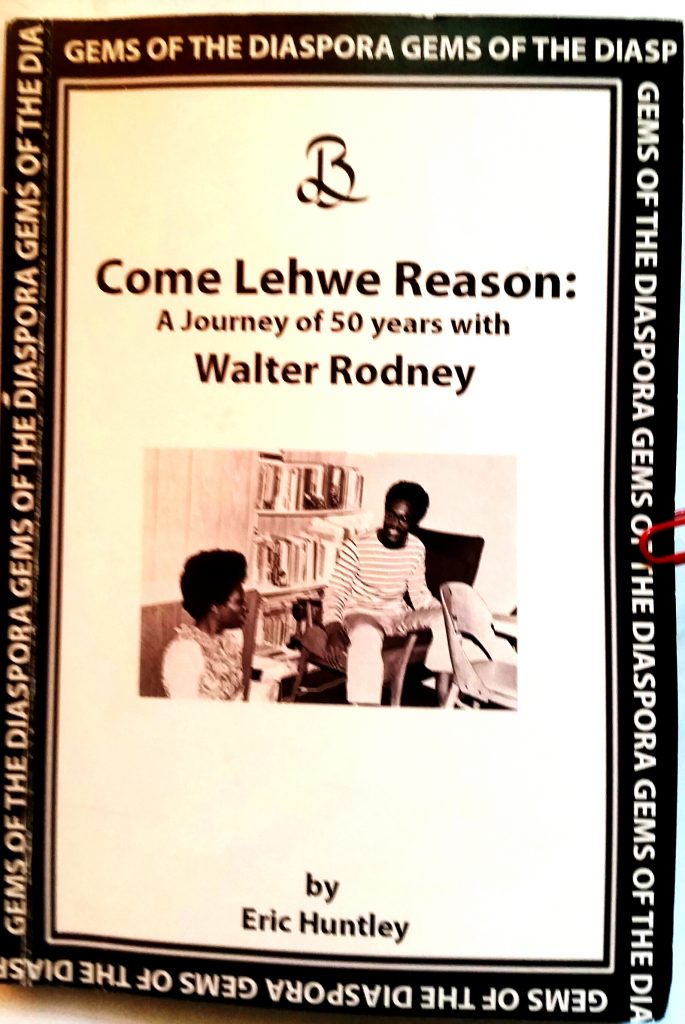 Come Lehwe Reason by Eric Huntley
Come Lehwe Reason by Eric Huntley
Some books have a knack (yes, books have a life of their own; books are alive and have the capacity) of surfacing at the most appropriate time. ‘Come Lehwe Reason: A Journey of 50 years with Walter Rodney’ written and compiled by Eric Huntley and published Bogle L’Ouverture Publications, is one such book, surfacing at a time when Guyana, transfixed by elections implosion and by monstrous economic explosion, may need to ‘reason’ one with the other.
‘Come Lehwe Reason’ is a tiny, yes, yet another tiny book pregnant with meaning, that will turn over in the minds of readers for as long as it takes Guyana to rid itself of the baggage of the past.
This tiny book effectively makes use of space starting with the cover design. The picture on the front cover shows Walter Rodney and Jessica Huntley reasoning in the front room of Huntleys’ home in Colderhaw Road where the Huntleys’ book shop first started. Bordering the four sides of the front cover are the words in bold print: ‘Gems of the Diaspora’. This border sets into train a series of books in the making, namely ‘African and Indian Identities in colonial Guyana in the 1930s’ by Clem Seecharan; ‘Thomas Clarkson, My Saint’ by Joyce Trotman; CLR James’ Contribution to the Caribbean 1950-1980’ by Natalie Coppin; ‘Andrew Salkey: 40 years of Creative Writing’ by Beverly Cuffy; and ‘From Windermere Road to Coldershaw Road’ by Eric Huntley.
50 years of the journey with Walter Rodney is detailed in fifteen chapters with a ‘publisher’s note’ at the beginning, numerous photographs within and a list of books by Rodney at the end, all coming together to make this book more than just a collector’s item.
Many bits of information are new, others well established facts, both arranged in a new setting and from a new perspective. In ‘Rodney Speaks’, the following words show the academic and the humanity of the man at work leading to such seminal publications like ‘A History of the Guyanese Working People, 1881-1905’.
I was brought up …in a typical range yard. And, there, amidst the poverty, looking back now, I can see…ordinary black people who were worth everything, who were human beings who had strength, who had character…some were miracle workers, because it’s a miracle how they used to bring up families on what they earned’.
Chapter after chapter, this is the trend – significant bits of information piecing together a picture of the life and times of Walter Rodney. So in the chapters, ‘Walter’s Early Years’ and ‘Coming of Age’, the reader will get a better feel of his formative days during which time he shared in the ‘spectacle of Christmas festivities such as ‘Mother Sally’, the ‘Centipede and masquerade Bands’, learned about the ‘backoo’, partook in backdam escapades, witnessed improved health conditions due to the use of D. D. T., witnessed the burgeoning of Friendly and Burial Societies, Fraternal Lodges, bookshops including ‘one at the Railway Station’, high schools, Correspondence Courses, heard about the how the people reacted to the Moyne Commission’s deliberations been broadcast ‘over the public address system at the Bourda Green’, knew about the strikes affecting bauxite, sugar, railway and transportation, aware of politics of the day with Cheddi Jagan election to the Legislative Council, aware of his own father’s role as a ‘founder member’ of the People’s Progressive Party (PPP) and his mother attending political meetings.
Rodney’s life and work unfolded in the following chapters, namely, ‘Jamaica Sojourn’, ‘Africa to the Rescue’, ‘The Spark has been lit’, ‘Diary of Events of 16th October, 1968’, ‘Reaction to the ban’, and ‘Poetic Tributes’ in which one significant development must be mentioned and that is the banning of Rodney by Jamaica led to the formation of the Bogle L’Ouverture Publications and its first publication, ‘Groundings with My Brothers’.
In ‘Return to Guyana’, the reader will see how Rodney, against all advice and despite the fact that he was refused employment at University of Guyana twice in 1958 and in 1974, returned to his homeland to be assassinated not far from where he was born; he was killed in nobody’s backyard but his own.
But that was not the end of Walter Rodney as related by Eric Huntley who reported on the response to the assassination.
The title, ‘Come Lehwe Reason’ is as grassroots as it can get; this is groundings.
Responses to this author telephone (592) 226-0065 or email: [email protected]











